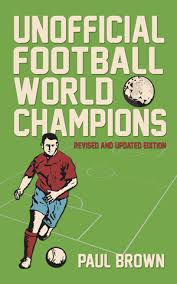Book Review: Unofficial Football World Champions by Paul Brown
Question: What is the link between the following? 1874 – Scotland, 1931 – Austria, 1963 – Dutch Antilles, 1979 – Paraguay and 2014 – Uruguay.
Answer: These are the years that these countries held the title of ‘Unofficial Football World Champions’ (UFWC).
 However, that then leads to the supplementary question of, how do teams become UFWC? Well there is a logical answer. All football fans know that the FIFA World Cup first held in 1930 and every four years since (except 1942 and 1946 due to the Second World War), produces the ‘official’ World Champions. What author Paul Brown came up with was an alternative notion where, “football’s world champions were decided via a continuous series of title matches stretching back to the very first international football match”.
However, that then leads to the supplementary question of, how do teams become UFWC? Well there is a logical answer. All football fans know that the FIFA World Cup first held in 1930 and every four years since (except 1942 and 1946 due to the Second World War), produces the ‘official’ World Champions. What author Paul Brown came up with was an alternative notion where, “football’s world champions were decided via a continuous series of title matches stretching back to the very first international football match”.
This meant that the first UFWC match took place in November 1872 between Scotland and England and is the starting point of an amazing trail that to date has entailed 879 games and has Uruguay as the current holders of the title. The UFWC ‘crown’ goes on the line on 05 March 2014 when Uruguay play Austria.
In the third edition of Unofficial Football World Champions, the reader is treated to a number of match reports from the UFWC fixtures, a complete list of the UFWC results and records including, amongst others, the ‘Top Goalscorers’ and ‘All-time Rankings’.
The reports are written with no little humour and a keen eye for detail, in that they not only provide information about the players and the match highlights, but some quirky facts and anecdotes. For instance, from the 1899 British Home Championship game between England and Ireland, which England won 13-2, Brown reflects that, “the fact that Irish goalkeeper James Lewis only had eight full fingers (he lost two fingertips in an accident) may have had some bearing on the final result”.
All manner of countries and competitions are covered as the reader sees the UFWC title change hands and it provides great interest, in that there are fixtures mentioned that without reading this book you would never have come across.
This book is not only interesting for the journey it covers, but for the sense of enthusiasm and sheer fun that come through its pages. It is also well supported by an excellent website www.ufwc.co.uk which provides articles relating to upcoming games and a range of other information.
Brazil 2014 is on the horizon and if Uruguay stay unbeaten in their friendlies prior to the tournament, the UFWC ‘crown’ will be up for grabs too. You never know on 19 June 2014, England could be UFWC once more!